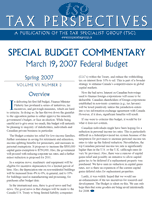
PDF Format
 Issue Contents Issue Contents
 All Issues All Issues
Spring 2007
Volume 7, Number 2
SPECIAL BUDGET COMMENTARY
March 19, 2007 Federal Budget
Overview
In delivering his first full budget, Finance Minister Flaherty has produced a series of initiatives, tax incentives, and get-tough measures, which are hard to criticize. In doing so, he has thrown down the gauntlet to the opposition parties to either approve his minority government's budget, or face an election. While being careful not to give away too much, this budget will certainly be pleasing to majority of stakeholders, individuals and Canadian private business in particular. The Budget contains tax relief for low-income families, further assistance in saving for retirement and education, income-splitting benefits for pensioners, and increases in personal exemptions. It proposes to increase the $500,000 capital gains exemption to $750,000. Also, the government will proceed with reducing corporate tax rates, and a further minor reduction is proposed for 2011. In a surprise move, machinery and equipment will be eligible for incentive depreciation for a limited period of time. Also, the depreciation rate on non-residential buildings will be increased from 4% to 6%, in general, and to 10% for buildings used in manufacturing and processing, for purchases after budget date. In the international area, there is good news and bad news. The good news is that changes will be made to the Canada-U.S. Treaty to bring limited liability companies (LLC's) within the Treaty, and reduce the withholding tax on interest from 10% to nil. This is part of a broader strategy to enhance Canada's competitiveness in global capital markets. Now the bad news. Interest on Canadian borrowings used to finance foreign corporations will cease to be deductible. Canadian shareholders of foreign corporations established in non-treaty countries (e.g., tax havens) will be taxed punitively unless the jurisdiction enters into a tax information exchange agreement with Canada. However, if it does, significant benefits will result. If one were to criticize this budget, it would be for what it does not contain. Canadian individuals might have been hoping for a reduction in personal income tax rates. This is particularly difficult in a federal/provincial tax system because of the temptation for provinces to increase personal income tax rates to take up the federal reduction. Nevertheless, the top Canadian personal income tax rate is significantly higher than in the U.S. or the U.K. (although rates do vary by province). Also, there was a rumour of capital gains relief and possibly an initiative to allow capital gains tax to be deferred if a replacement property was purchased. We have seen no reduction in capital gains rates, nor is there an expansion of the current capital gains deferral rules for replacement properties. Lastly, it was widely hoped that we would see an enhancement of the tax incentives for research and development. The Budget is silent on this. We can only hope then that some goodies are being saved intentionally for 2008.
| 



